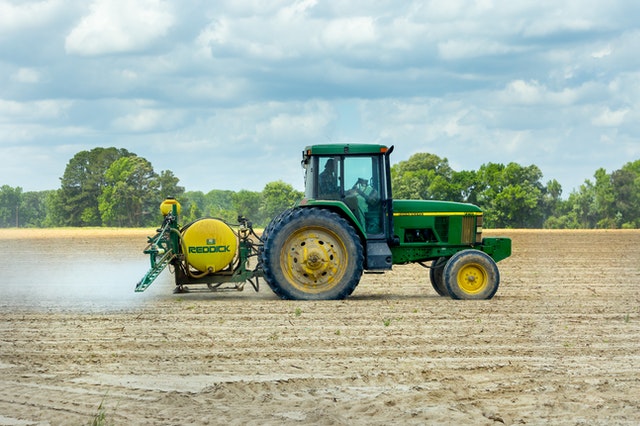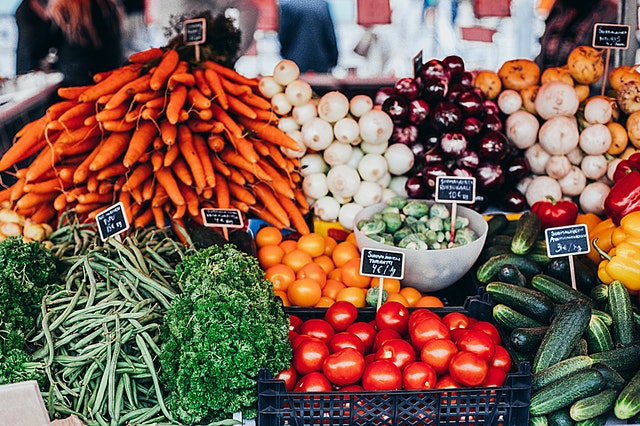Organic vs. Conventional: Why Organic is the Best Option
We are bombarded with food choices as we shop at grocery stores, eat in restaurants and turn on the television. When we make decisions about the foods we purchase, it is important to understand how those choices impact our health. My knowledge of organic vs. conventional produce wasn’t a priority until I was in an unhealthy state and began changing my diet. Through reading and researching, I became more aware of how conventional produce is covered in chemicals. I had grown a garden for years but had not really considered the health benefits to growing and caring for your own food.
Growing your own produce and shopping locally at farmer’s markets (or in the organic section of the grocery store) can ensure that you have clean, organic food. As I have continued to read and research, I am convinced that choosing organic food assists in reducing toxins in our bodies. It has recently become important to me to guide others in recognizing how organic food can positively impact their health.
Organic farming restricts use of pesticides

In my research, I stumbled across a website called the Environmental Working Group, (EWG), a non-profit organization that provides information to assist people in making healthier choices. Based on EWG’s analysis of the data from the Department of Agriculture, 70% of produce sold in the United States has residue of pesticides that have the potential to cause harm to those who consume them. Glyphosate, the most used pesticide in the US, and other pesticides that are sprayed onto conventional produce to kill weeds and insects are then absorbed by the plants. The residue of the pesticides sprayed on the skin of the produce remains even after they are washed. Research has shown that these pesticides can be harmful to our bodies in various ways, including causing both acute and chronic health problems.
Along with pesticides, synthetic fertilizers are not permitted on organic farms because they can leach into the ground and increase toxicity in the water. They kill beneficial microorganisms in the soil instead of feeding the soil what it needs to support the plant life. By eating organic foods, you are lowering your risk for exposure to these environmental toxins.
Consumer Reports published an article in 2020 titled “Stop Eating Pesticides.” The article relays that the most widely used pesticides (dacthal, acephate, chlorpropham, chlorpyrifos, cyhalothrin, famoxadone, fludioxonil and glyphosate) may cause damage to the brain and nervous system, have possible carcinogens, be a hormone disruptor, or interfere with the neuromuscular system. Spinach is shown to be the only organic produce that is not recommended to be purchased either conventionally or organically due to “33 different pesticides found on 76% of the samples”. A good reason for consumers to choose to grow their own spinach or going to a local farmers market to purchase. In my garden, I grow spinach from fall to late spring to ensure I have when I am unable to get at the farmers market.
Always wash your produce

[This post contains affiliate links. If you make a purchase, we make a small commission paid for by the vendor at no additional cost to you! We only suggest products we personally use and love, and know will make your life easier and healthier.]
Organic fruits and vegetables may have some residue of pesticides due to drift from nearby conventional farms or because organic produce is contaminated during transportation when put into bins which previously had conventional fruits and vegetables. Because of the possibility of your organic fruits and vegetables having traces of pesticide residue, it is important to wash all fruits and vegetables under cold running water for 15-20 seconds. An organic produce wash is another option for cleaning your produce before washing. For produce with harder skins, wash rubbing with your hand or with a vegetable brush.
Organic food is more nutritional
Studies have shown that organic produce has healthier nutrients. Organic fruits and vegetables have been found to have 20-40 percent more antioxidants than their conventional counterparts. Organically grown produce is richer in Vitamin C and the minerals magnesium, iron, calcium, potassium and phosphorus. Eating an organic diet has also been noted to reduce allergies, and aid in other health issues.
Organic food tastes better
Many food experts and chefs believe that organic foods tend to taste better. The food experts give credit to the soil care practiced by organic farmers. Strong nourishment of the soil leads to well-nourished plants. In return, the soil yields food with a high nutritional content and optimal flavor. A study published in 2014 in the British Journal of Nutrition stated that the antioxidant levels in organic food are higher therefore enhancing the aroma and taste of the produce.

But if you are conflicted about whether this is true or not, taste for yourself! Go to the store and buy some conventional produce. Then, go to the farmers market or your garden and taste test the same produce. In my school garden club, students tasted organic carrots from the raised beds verses a carrot from the school cafeteria and many students commented on how the carrot from the cafeteria didn’t have the flavor that the carrot from the garden had. Will you be able to spot the same difference?
The “Dirty Dozen”
The EWG determines the top 12 crops that have the most contamination than any other crop that is rated. One-third of conventional strawberry samples have at least 10 different pesticides and some individual samples tested have shown up to 20 different pesticides. As well, some variations of kale had up to 18 different pesticides. These pesticides include toxins that are either known or probable carcinogens, hormone disruptors, or neurotoxins. Because of the contamination of the conventional produce, it is safest to choose organic produce for those on the dirty dozen list, especially those at the top of the list with the most toxic residue.
2020 Dirty Dozen (ranked from most to least contaminated):
- Strawberries
- Spinach
- Kale
- Nectarines
- Apples
- Grapes
- Peaches
- Cherries
- Pears
- Tomatoes
- Celery
- Potatoes
In addition to this list, raisins have been categorized as the dirtiest of all fruits. In tests done on over 600 samples of raisins, 99% of the raisin selected had residue of at least two pesticides. If you are purchasing raisins make sure that they are organic. Some additional foods less known to test high in pesticides include oats, hot and sweet peppers, herbs, beans/legumes, and rice/wheat. Purchase these items organic if possible.
The “Clean 15”
As opposed to the previous, a list is also compiled of the cleanest produce. Seventy percent of the Clean 15 have no pesticide residue on the surface of the produce. The remaining produce may have some pesticide residue but it is infrequent to have more than one. By rinsing your produce for 15-20 seconds you can further reduce your risk of contamination. The Clean 15 are safe produce to purchase conventionally.
2020 Clean 15 (ranked from least contaminated):
- Avocados
- Sweet corn
- Pineapple
- Onions
- Papaya
- Sweet peas (frozen)
- Eggplant
- Asparagus
- Cauliflower
- Cantaloupes
- Broccoli
- Mushrooms
- Cabbage
- Honeydew
- Kiwi
Begin your transition to organic
Choosing to eat a diet rich in food that has been raised organically can affect our health in a positive way. Organic produce is not only higher in nutrients and antioxidants but can aid in reducing allergies and other health issues. It also tastes better. Pick up a tomato at the store and then either grab one off the tomato plant in your garden or from your local farmers market and see the difference in the taste. For me, there is no choice. Choosing organic food is one of the ways that I choose to minimize my toxic load (a term for another blog post!) I hope that you have found this useful and it will serve as a guide as you make decisions about your food choices.

Hi my name is Victoria! After years of struggling with illnesses, I began a journey of finding healthier alternatives in every aspect of my life. Over the past 7 years, I have researched health, nutrition, sustainability and gardening, and I am looking forward to sharing that knowledge with you!
Where do bananas fall in these 2 lists?
Conventional bananas are sprayed with synthetic fertilizers and herbicides but with their thick peel they are protected from most of the pesticides. However, some of the chemicals are in the soil so a small amount could end up in the fruit.
Starting a site kind of like this one forced me to do some research and I found your post to be quite helpful. My content is centered around the idea of knowledge, fun and sharing. I wish you first-rate luck with your site in the future and you can be sure I’ll be following it.